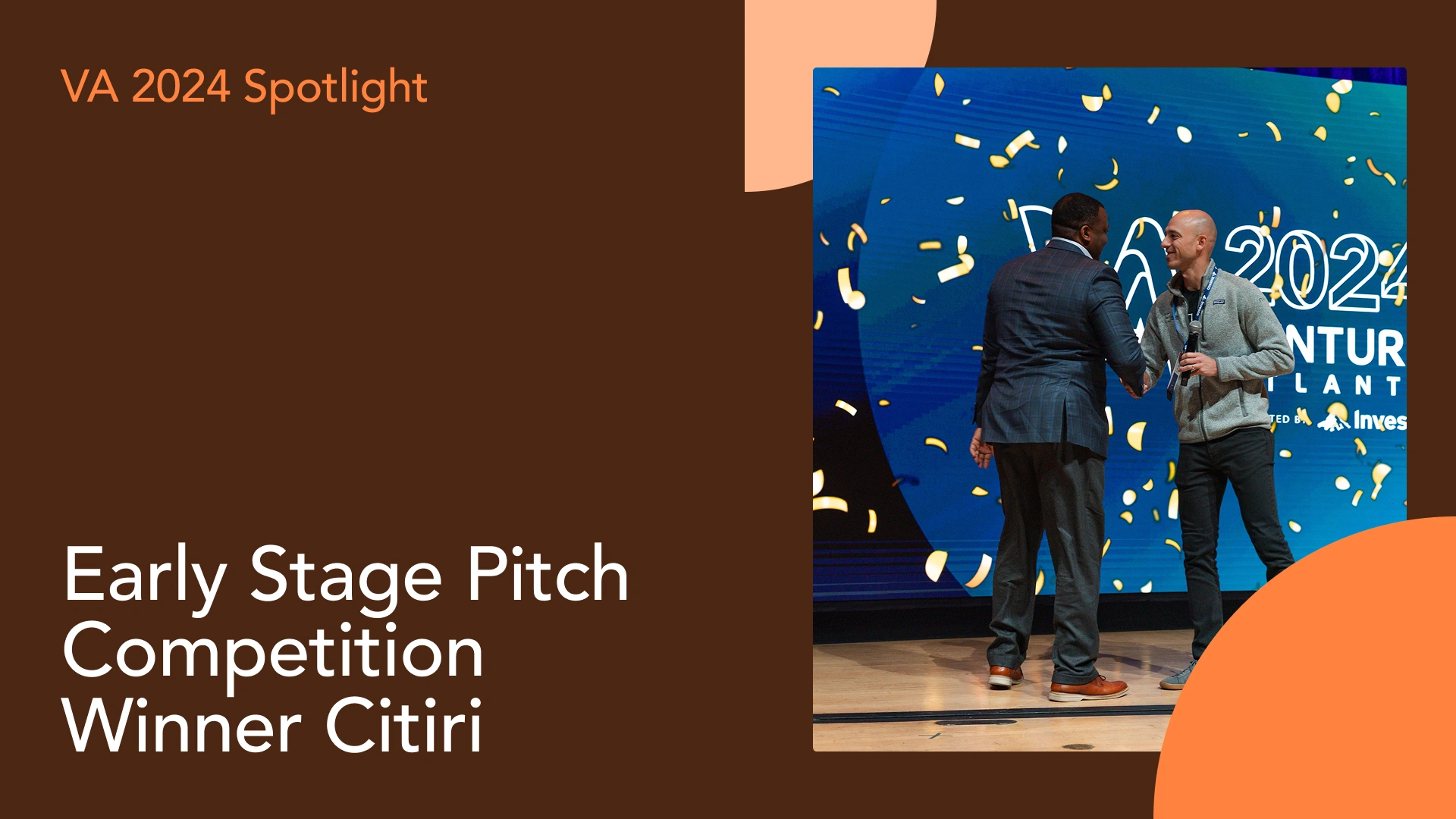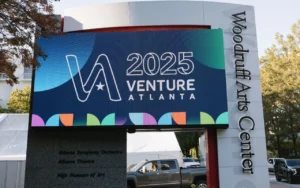Ortez Gude is the founder and CEO of Citiri, a fast-growing startup that’s rewriting the playbook for how major infrastructure—airports, hospitals, transit systems—gets from the planning phase to successful operations.
Fresh off winning the Venture Atlanta 2024 Early-Stage Pitch Competition, Citiri is doing more than digitizing an old process—it’s defining an entirely new category. In an industry where billion-dollar projects can be undone by last-minute surprises, Citiri replaces guesswork with real-time intelligence, giving leaders the visibility and control they need to open complex facilities smoothly, safely, and on time.
And it's working. Since launching, Citiri has experienced incredible growth not just by automating a complex process—not just by automating a complex process, but by truly taming the chaos associated with bringing massive projects to successful openings and efficient long-term operations. Major international airports—including San Francisco (SFO), Los Angeles (LAX), Seattle-Tacoma (SEA), and Atlanta (ATL)—are among the customers that have used Citiri to guide complex projects to smooth, successful openings.
We sat down with Gude to talk about building trust in high-stakes transitions, creating a new category from scratch, and why owners of the world’s most critical infrastructure can’t afford to fly blind anymore.
What Problem Does Citiri Solve in the Construction Industry?
Citiri addresses a critical, often overlooked issue: infrastructure project owners are underprepared to manage the handover and operational readiness of facilities. This issue leads to costly delays and, in some cases, devastating consequences.
The platform aims to empower the organizations responsible for delivering critical infrastructure because successful project handover demands careful planning, thorough documentation, and purposeful execution.
How Did Ortez Gude Come Up With the Idea For Citiri?
Gude’s journey started in the construction industry, where he witnessed firsthand the breakdown between project completion and operational handoff. He noted that the root of the problem sits with the project owner, who is often ill-equipped to handle a complex facility’s transition into active use.
For Ortez Gude, this problem became personal. While in college and expecting his first child, his family needed life-saving cancer treatment only available at Duke University. However, the hospital had reduced its bed count due to delayed construction.
“That delay was literally a matter of life or death,” Gude said.
He first tackled this issue through Corvado, a consulting company, before realizing that true scale would only come through specialized software he was uniquely qualified to develop.
“No one was bringing on technology to help this issue,” Gude recalls. “I recognized that was because no one was looking at the problems from a project owner perspective.”
This experience ignited a 30-year obsession that led to the creation of Citiri—software designed to guarantee construction projects, especially critical ones like hospitals and transportation hubs, are delivered ready to operate. Citiri collapses the information silos and presents all stakeholders with a clear view of the project flow.
How Has the Startup Ecosystem of the Southeast Influenced or Supported Citiri’s Growth?
According to Gude, the Southeastern startup scene offers something unique: brotherhood.
Being a CEO of a startup is a tough job, and one that requires a lot of tough decision-making. It can be hard for your family, friends, and peers to understand the “why” behind your choices.
“Being a tech startup CEO is one of the hardest and loneliest jobs,” said Gude. “There are people here [Atlanta] who really understand what you’re going through.”
He explains that Southern charm mixed with high-tech grit is a recipe that not only helped Citiri thrive, but what makes the Southeastern startup ecosystem elite.
What Are the Biggest Things You’ve Learned on Your Entrepreneurial Journey?
Building Citiri has been a masterclass in prioritization and resilience. One of the things he speaks candidly about is the struggle of moving from a service-based business to a product-based one.
“It’s hard to let go of a revenue stream,” he admits, “but if you want to scale and solve the root problem, you’ve got to go all in.”
That leap required strategic shifts and a deep internal alignment.
“You have to prioritize what’s important for the company,” Gude says, “but also who you need to become in order to serve that vision.”
For him, that meant finding his own success formula. He had to learn to balance ambition, clarity, and relentless focus. He also emphasizes the importance of being “obsessed with the problem” and never stopping the learning process, especially when serving a market with high stakes like construction.
How Has Venture Atlanta Impacted Citiri's Growth?
Gude’s connection to Venture Atlanta began over a decade ago.
He first attended the conference back in 2011, during his early efforts to transform Corvado into a product-based company. Gude was eager to learn how other CEOs were navigating the same “product problem” he was facing. By 2019, Citiri had earned a spot as a showcase company. And in 2024, things came full circle—Citiri took the stage as the Early-Stage pitch competition winner.
Over the years, Venture Atlanta has not only been a place to gain exposure for him but also a gateway to meaningful connections with fellow founders, investors, and industry leaders.
“Allyson has been phenomenal for us,” Gude says, referring to Venture Atlanta’s CEO, Allyson Eman. “She is a beacon for the tech industry.”
Winning the Early-Stage pitch competition has accelerated Citiri’s growth in several ways. He credits Venture Atlanta for expanding their network, creating visibility for recruiting, and giving their team access to resources they wouldn’t have had otherwise.
Most importantly, it opened doors with investors and has exponentially grown those relationships since the conference. For a construction technology startup like Citiri, those relationships are game-changing.
How Did You Prepare For Your Pitch?
Interestingly, Gude didn’t carve out special time to prepare for Citiri’s pitch. As someone deeply immersed in solving a painful industry problem, pitching is second nature.
“I don’t know if I really prepared,” he says, “Because really, you’re preparing yourself every day.”
He emphasized that in enterprise software, it’s not just about showcasing your product—it’s about demonstrating that your company is built to last. Enterprises want to work with partners they can trust to be around for the long haul. That’s why clearly articulating both your value proposition and the long-term viability of your business is essential.
“When you’re obsessed with the problem, you naturally learn how to convince customers that you can solve it for them,” Gude says.
For him, a strong pitch is rooted in clarity of purpose and message. It’s about constantly refining your story to align with the needs of the market you’re aiming to serve.
What’s Next for Citiri After Venture Atlanta?
The exposure to over 450 investors from more than 250 funds nationwide, combined with strategic coaching, media coverage, and networking opportunities, gives early-stage companies like Citiri a powerful platform to grow.
With its Early-Stage pitch competition win under its belt, Citiri is focused on building momentum and scaling for the next phase of growth. The team is currently rebuilding the platform to support its vision, leveraging embedded AI to further streamline operational readiness software and solve infrastructure challenges faster and more intelligently.
AI in construction has become a hot topic in the industry, and for good reason. AI technologies, such as machine learning and computer vision, are being integrated into various aspects of construction, from project planning to on-site safety monitoring. These tools enable real-time decision-making, risk assessment, and resource optimization, leading to more streamlined and cost-effective projects.
As Citiri builds on this momentum, Gude and his team are committed to refining their technology, expanding their reach, and continuing to lead innovation in the construction technology startups space. The road ahead is ambitious, but Citiri is more ready than ever.
What’s Your Advice for Entrepreneurs?
Gude leaves us with candid wisdom that is applicable to everyone in the startup ecosystem:
1. Align Your Life
When you’re young and starting to get into the startup world, it can be hard to break through the noise, but it’s easier to drop everything and have fewer responsibilities holding you back. However, when you begin to have a family or marriage, it gets even harder.
“Your spouse has to be 100% bought into your idea and willing to take this ride with you, or else you will not succeed,” Gude says.
This piece of advice goes back to Gude, explaining that the startup world can be a lonely place where your family may not understand what you’re going through. However, the most important thing is not that they understand, but that they are willing to go along with it.
2. Don’t Join a Pitch Competition Just for the Sake of It
Gude feels that a lot of CEO’s lose sight of the main goal: selling.
“You’ve got to sell,” says Gude. “If you’re putting all of your time into these pitch competitions, it’s just a distraction.”
While pitch competitions can offer valuable exposure and resources, they’re no substitute for traction. At the end of the day, it’s sales, not slides, that truly scale a business.
3. Never Quit
Gude understands what it feels like to want to give up.
“It’s going to seem like there are multiple times you should quit, or your company might almost die five times,” says Gude. “But you’ve got to push through.”
That kind of resilience, he explains, is part of the entrepreneurial journey. Expecting setbacks—and pushing forward anyway—is what separates those who build lasting companies from those who burn out too soon.
Be the Next Venture Atlanta Pitch Competition Winner
Each year, Venture Atlanta amplifies the voices of startups like Citiri—putting them in front of the investors and leaders who can help bring their vision to life.
Think you have what it takes to be the next Early-Stage pitch competition winner? Stay tuned to Venture Atlanta’s event page to make sure you don’t miss your chance to be on stage next year!
In the meantime, read through our pitch competition winner spotlights from 2023:


